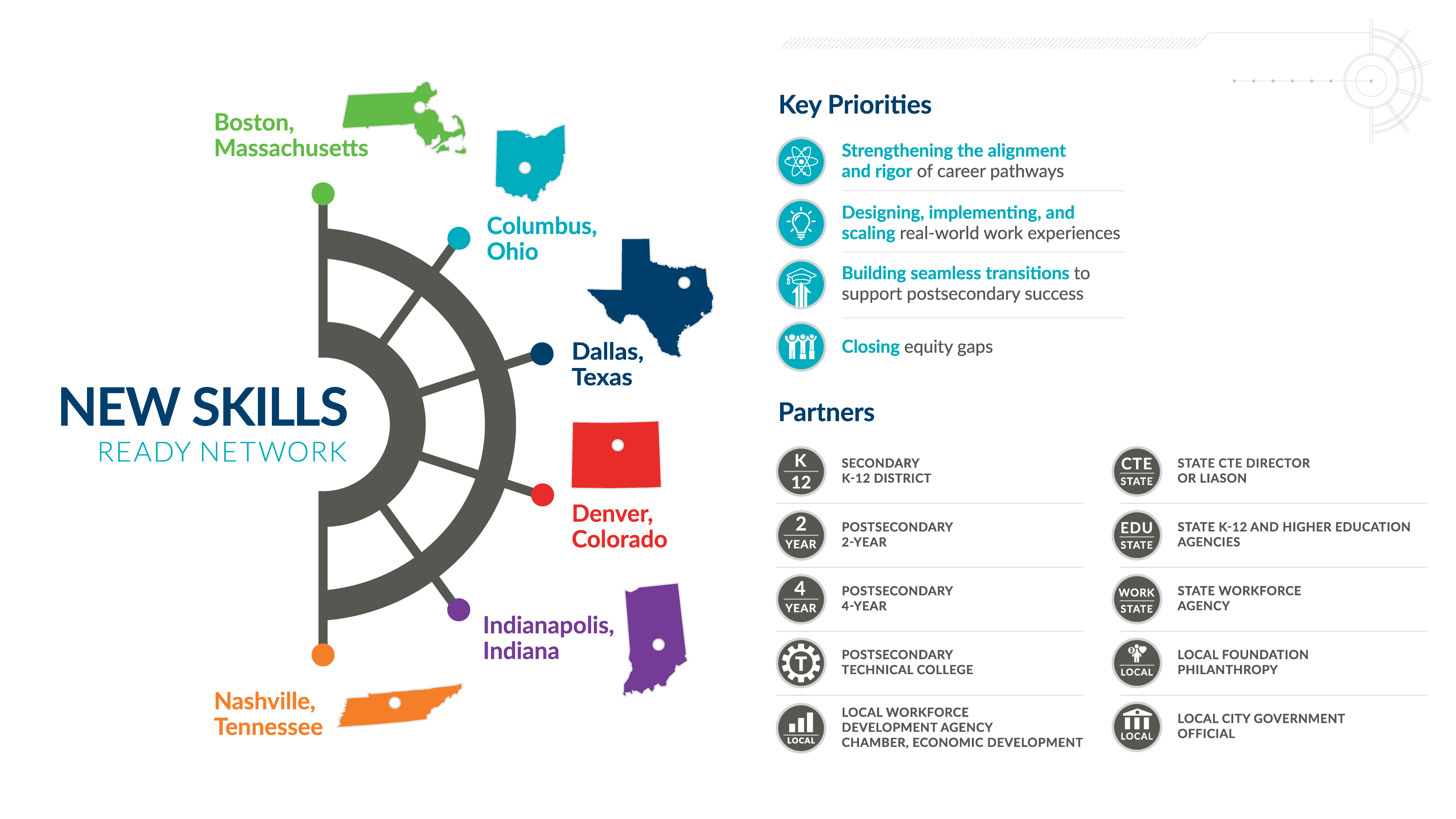In 2020, JPMorgan Chase & Co. launched the New Skills ready network across six domestic sites to improve student completion of high-quality career pathways with a focus on collaboration and equity. As a national partner in the New Skills ready network, Advance CTE strives to elevate the role of state capacity and resources in advancing project priorities and gain a unique perspective on promising practices to strengthen state-local partnerships across the country.
Our newest blog series will highlight innovative tools and initiatives produced across the six sites that advance the initiative’s four key priorities and serve as a guide for state leaders in their work to create cohesive, flexible and responsive career pathways.
For this post, Policy Associate Dan Hinderliter interviewed Jennifer O’Shea, Postsecondary Readiness Officer for Indianapolis Public Schools (IPS) to learn more about their career pathway evaluation framework used to measure the quality of their 42 pathway programs.

Purpose
O’Shea shared that developing a pathway quality framework rubric had several purposes:
- To develop consistent criteria to evaluate secondary and postsecondary pathway quality and means to conduct program change or termination as needed
- To identify a cohort of pathways to pilot improvements that result in substantial increases in student outcomes over five years and promising practices to apply to all 42 pathways
- To utilize data-driven means to intervene proactively when enrollment disparities occur in pathways for historically marginalized populations to enhance supports and improve learner outcomes
Ultimately, the project team is aiming for all IPS students to be “future-ready” graduates with a significant portion completing and earning credit for early postsecondary credit through CTE, Advanced Placement, International Baccalaureate, and Early College programs.
Framework Composition
The framework was created by a consulting firm using the foundations of the Association of Career and Technical Education’s (ACTE) Quality CTE Program of Study Framework and Naviance’s college, career and life readiness framework to create program quality criteria.
Both qualitative and quantitative feedback was incorporated into this framework. In addition to considering existing CTE programs of study requirements, feedback regarding program quality was collected from families, school counselors, administrators, instructors and industry partners. In addition to the rubric, evaluators will also examine enrollment and completion data disaggregated by race to identify enrollment disparities as a quality indicator.
Framework Use
After the evaluation was completed for all 42 pathways, each pathway component each was coded red, yellow or green. The coding was then used to decide to sunset, merge or enhance each pathway. Five pathways had a substantial number of green components and identified as already achieving substantial alignment with the quality criteria.
Five pathways were chosen as an initial focus group for enhancement as part of Indianapolis’ New Skills ready network priorities in consultation with local two and four year institutions that will partner with IPS to create more seamless postsecondary transitions and early postsecondary opportunities. The five career pathways chosen were Business Administration, Construction Trades, Digital Manufacturing, Engineering, and IT Tech Support & Services.
Benefits of New Skills ready network Partnership
While the district’s work to evaluate and improve pathway program quality began prior to joining the New Skills ready network, O’Shea shared that participating in the initiative has made the process more impactful and collaborative. She cited the initiative’s focus on collaboration as a means to utilize lessons learned from other sites as well as create a more comprehensive framework based on input from K-12, postsecondary, industry and workforce leaders rather than operating in a silo. The initiative’s funding also allowed for long-term investments to evaluate and maintain program quality through the addition of a data analyst, employer engagement manager, and a new college and career exploration course for middle grades.
For more information about the early accomplishments of Indianapolis and the five other sites that are part of the New Skills ready network, view Advance CTE’s Year One snapshots. For more resources on strengthening career pathways, visit the Learning that Works Resource Center.


 State Name: Missouri
State Name: Missouri